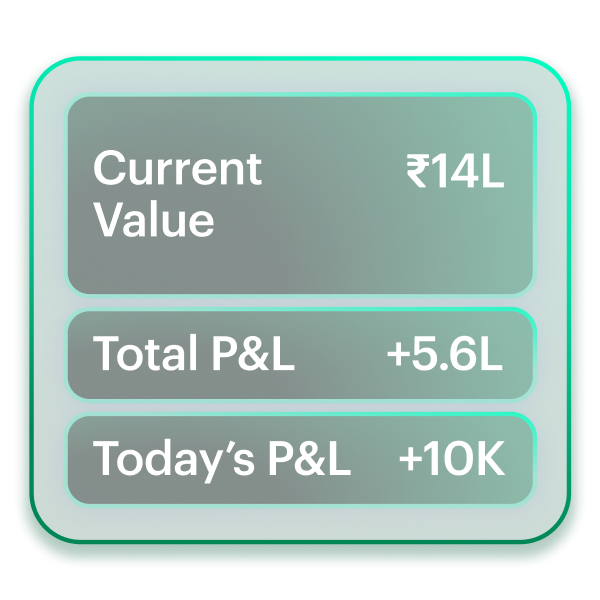Last Updated on Apr 11, 2025 by vanessa sequeira
Halal stocks in India refer to shares of companies whose business activities comply with Islamic principles, making them suitable for investment by Muslims and others interested in ethically responsible investing. The concept of “halal” extends beyond food to include financial and business practices that are permissible under Sharia law. In this blog, we have charted down the list of halal shares in India, along with details of Shariah compliance, key principles, what makes a stock halal, and more.
Table of Contents
List of Halal Stocks in India (Nifty 50)
| Name | Sub-Sector | Market Cap (Rs. in cr.) | Close Price (Rs.) | PE Ratio |
| Reliance Industries Ltd | Oil & Gas – Refining & Marketing | 1,716,278.00 | 1,267.60 | 24.65 |
| Tata Consultancy Services Ltd | IT Services & Consulting | 1,500,822.53 | 4,145.90 | 32.69 |
| Infosys Ltd | IT Services & Consulting | 772,298.41 | 1,864.55 | 29.44 |
| Hindustan Unilever Ltd | FMCG – Household Products | 561,663.59 | 2,389.20 | 54.65 |
| HCL Technologies Ltd | IT Services & Consulting | 503,056.64 | 1,858.95 | 32.04 |
| Sun Pharmaceutical Industries Ltd | Pharmaceuticals | 424,476.57 | 1,768.20 | 44.33 |
| Maruti Suzuki India Ltd | Four Wheelers | 346,217.51 | 11,006.05 | 25.67 |
| Adani Enterprises Ltd | Commodities Trading | 326,437.73 | 2,826.80 | 100.77 |
| UltraTech Cement Ltd | Cement | 309,365.03 | 10,728.50 | 44.16 |
| Titan Company Ltd | Precious Metals, Jewellery & Watches | 282,559.14 | 3,183.70 | 80.82 |
Note: The list of halal stocks in India is selected from Nifty 50 and is not sorted based on any criteria. The data on this list was taken from the Tickertape Stocks Screener on 14th November 2024.

Overview of the Halal Stocks in India
Reliance Industries Ltd
Reliance Industries Ltd (RIL), founded in 1973 by Dhirubhai Ambani, is one of India’s largest conglomerates, with interests spanning oil and gas, retail, telecommunications, and petrochemicals. Its Oil & Gas – Refining & Marketing segment is particularly notable, making RIL a dominant player in the global energy sector.
With a market capitalisation of Rs. 1,716,278.00 cr. as of 14th November 2024, RIL aligns with halal principles in its oil and gas refining operations, which are permissible under Islamic law. These activities do not involve haram practices such as alcohol production, gambling, or interest-based financing, making it a Sharia-compliant stock. Furthermore, the company’s ethical financial practices and focus on sustainable business growth enhance its appeal to Islamic investors.
Tata Consultancy Services Ltd
Tata Consultancy Services Ltd (TCS), established in 1968 as part of the Tata Group, is a global leader in IT services and consulting. The company provides digital transformation solutions, cloud services, and artificial intelligence capabilities to industries such as banking, healthcare, and retail. TCS operates with a strong focus on ethical practices, adhering to corporate governance standards that align with Islamic investment principles.
As of 14th November 2024, TCS has a market capitalisation of Rs. 1,500,822.53 cr., placing it among the largest IT companies in the world. The company’s operations are free from haram activities such as gambling or interest-based earnings, making it a suitable choice for Sharia-compliant portfolios. Its global presence and focus on innovation add to its long-term appeal for ethical investors.
Infosys Ltd
Infosys Ltd, founded in 1981 by Narayana Murthy and a group of co-founders, is a pioneer in the IT services and consulting industry. The company focuses on areas such as digital transformation, artificial intelligence, and cloud computing, delivering solutions to industries worldwide. Infosys is known for its robust corporate governance and adherence to ethical business standards.
With a market capitalisation of Rs. 772,298.41 cr. as of 14th November 2024, Infosys ensures compliance with halal investment principles by maintaining a business model that avoids haram industries such as alcohol production, gambling, and conventional banking. The company’s innovation-driven approach and commitment to sustainable growth make it an attractive option for Islamic investors.
Hindustan Unilever Ltd
Hindustan Unilever Ltd (HUL), founded in 1933, is a leading player in the FMCG sector in India. The company offers a wide range of household and personal care products, including food and beverages. Its focus on sustainable development and ethical sourcing aligns with Sharia principles, particularly in its food and personal care segments.
As of 14th November 2024, HUL has a market capitalisation of Rs. 561,663.59 cr. The company ensures that its business operations do not involve haram activities, making it a viable choice for Islamic investors. Its widespread presence in India and emphasis on innovation in sustainable products enhance its standing as a halal investment option.
HCL Technologies Ltd
HCL Technologies Ltd, established in 1976, is one of India’s leading IT services companies. The company provides a wide range of technology solutions, including software development, infrastructure management, and consulting services, catering to industries such as healthcare, manufacturing, and finance. HCL Technologies has built a reputation for innovation and adherence to ethical business practices.
With a market capitalisation of Rs. 503,056.64 cr. as of 14th November 2024, HCL Technologies qualifies as a halal stock due to its clean revenue streams and absence of involvement in industries prohibited under Islamic law. Its strong global presence and emphasis on research and development make it a preferred choice for Sharia-conscious investors.
Sun Pharmaceutical Industries Ltd
Sun Pharmaceutical Industries Ltd, founded in 1983, is a leading pharmaceutical company in India and globally. The company develops, manufactures, and markets generic medicines and speciality drugs. Its focus on healthcare aligns with Islamic principles, as the pharmaceutical industry is considered halal when operations avoid haram substances and practices.
As of 14th November 2024, Sun Pharma has a market capitalisation of Rs. 424,476.57 cr. The company’s ethical approach to business and its commitment to improving global health standards enhance its attractiveness as a halal investment option for Islamic investors.
Maruti Suzuki India Ltd
Maruti Suzuki India Ltd, established in 1981, is India’s largest automobile manufacturer, specialising in passenger vehicles. The company is renowned for its innovation in fuel-efficient and environmentally friendly cars, catering to a wide range of consumer needs. The manufacturing and sale of vehicles are permissible under Sharia law, making Maruti Suzuki a halal stock.
With a market capitalisation of Rs. 346,217.51 cr. as of 14th November 2024, Maruti Suzuki upholds ethical standards in its operations, avoiding any involvement in prohibited industries. Its focus on sustainability and growth strengthens its position as a Sharia-compliant investment.
Adani Enterprises Ltd
Adani Enterprises Ltd, the flagship company of the Adani Group, was established in 1988. It operates across various sectors, including commodities trading, natural resources, and infrastructure. While its commodities trading business is largely halal, it is important for Islamic investors to review its debt levels and specific activities for full compliance with Sharia principles.
As of 14th November 2024, Adani Enterprises has a market capitalisation of Rs. 326,437.73 cr. For those seeking halal investment options, the permissible segments of Adani’s operations present an opportunity, provided additional due diligence is conducted regarding Sharia compliance.
UltraTech Cement Ltd
UltraTech Cement Ltd, a subsidiary of the Aditya Birla Group, was founded in 1983. It is India’s largest producer of grey cement, ready-mix concrete, and white cement. The production of cement and related materials is considered halal as it does not involve haram practices or industries.
As of 14th November 2024, UltraTech Cement has a market capitalisation of Rs. 309,365.03 cr. The company’s strong commitment to sustainable construction and innovation positions it as a viable halal investment option in the infrastructure sector.
Titan Company Ltd
Titan Company Ltd, founded in 1984 as a collaboration between the Tata Group and Tamil Nadu Industrial Development Corporation, is a leader in the jewellery and watch industry. The company’s focus on gold jewellery, which is permissible under Sharia law when ethically sourced, aligns with Islamic investment principles.
With a market capitalisation of Rs. 282,559.14 cr. as of 14th November 2024, Titan’s adherence to ethical business practices and its prominence in the luxury goods market make it a preferred halal investment for those interested in the retail sector.
What Are Halal Stocks?
Halal stocks refer to shares of companies whose activities and financial structures align with Islamic principles (Shariah law). These stocks are considered ethical investments for individuals who follow Islamic guidelines. Shariah prohibits certain industries and practices, such as those involving alcohol, gambling, pork products, and interest-based financial activities. Therefore, companies operating in these industries are excluded from the halal stock universe.
For example, halal stocks in India might include businesses focused on technology, healthcare, or manufacturing, provided they meet the required financial and ethical criteria.
What Is Shariah Compliance?
Shariah compliance means adhering to Islamic laws and principles. In the context of investments, this includes avoiding prohibited activities, maintaining ethical business practices, and adhering to specific financial guidelines. Companies must meet criteria such as avoiding high levels of debt and refraining from earning substantial income from haram (prohibited) activities.
A key resource for identifying Shariah-compliant investments is the NIFTY 50 Shariah Index, which includes a list of halal stocks in India. Investors can also refer to Shariah boards or Islamic scholars to verify compliance.
What Makes a Stock Halal?
A stock is considered halal if it fulfills both ethical and financial criteria. These include:
- Business Activity: The primary business should not involve industries prohibited under Shariah law, such as tobacco, alcohol, gambling, or pork-related products.
- Debt-to-Equity Ratio: The company’s financial structure should limit reliance on interest-based debt. A commonly accepted threshold is that total debt should not exceed 33% of total assets.
- Income from Non-Compliant Activities: Revenue from non-permissible activities should not exceed 5% of total income.
- Ethical Practices: The company must adhere to transparent and ethical practices.
For example, halal shares to buy in India might include stocks like TCS or Infosys, which typically meet Shariah-compliant standards due to their low debt and permissible business operations.
Key Principles of Shariah Investments
The company’s primary business must be halal (according to Islamic law – Shariah). Under Shariah law, companies engaged in gambling, alcohol, tobacco, etc., are excluded.
- The total ‘Debt to Equity ratio’ should be lower than 33%.
- Shariah indices exclude companies with Accounts Receivables/Market equity value greater than or equal to 49 %.
- In Shariah-compliant companies, revenues from non-compliant activities are permissible only if the revenue from the non-permissible income is less than 5%.
- Shariah Boards laid down these principles, and 935 companies are compliant with Shariah principles in the Nifty index.
Why Invest in Halal Stocks?
Investing in halal stocks allows you to grow wealth ethically and in alignment with your values. Here are a few benefits of investing in halal stocks:
- Religious Compliance: For those who follow Islamic teachings, investing in halal stocks provides an opportunity to earn returns without compromising their beliefs.
- Social Responsibility: Many halal stocks are in industries promoting positive contributions, such as renewable energy, technology, and healthcare.
- Transparency: Shariah-compliant companies often have stringent reporting standards, ensuring that their operations and finances remain ethical and clear.
- Long-Term Growth: Many halal stocks belong to industries with consistent growth potential, such as technology and consumer goods.
How to Identify the Best Halal Stocks in India?
Identifying halal stocks requires careful screening. Consider the following steps:
- Analyse Core Activities: Ensure the company avoids haram industries like gambling, alcohol, and conventional banking. Focus on sectors such as technology or healthcare.
- Financial Ratios: Use Tickertape Stock Screener to check compliance. Ensure debt is below 33% of market capitalisation and non-halal income stays under 5%.
- Refer to Shariah Indices: Consult indices like the NIFTY 500 Shariah for pre-verified compliant stocks.
- Governance Practices: Look for companies with ethical governance and adherence to ESG standards.
- Stay Updated: Follow market trends in industries that typically align with Islamic principles, such as renewable energy or IT.
These steps can help you identify Shariah-compliant stocks in India and build an ethical investment portfolio.
How to Invest in Halal Stocks?
Investing in halal stocks involves selecting companies that comply with Shariah principles. Here’s how you can proceed:
- Direct Investment: Explore halal stocks listed in indices like the NIFTY 50 Shariah Index. These indices pre-screen companies for compliance.
- Halal Mutual Funds: Consider funds which invest exclusively in Shariah-compliant stocks.
- Stock Screeners: Use Tickertape Stock Screener to filter halal stocks based on financial ratios and business activities.
- Check Financial Ratios: Verify compliance by ensuring interest-bearing debt is below 33% of total assets and non-compliant income doesn’t exceed 5%.
- Consult Experts: Seek guidance from financial advisors familiar with Islamic investing.
By integrating these methods, you can ensure that your investments align with both financial and religious goals.
Who Should Invest in Halal Stocks?
Halal stocks can be a suitable choice for individuals who prioritize ethical investing and value adherence to specific principles. These stocks are ideal for:
- Investors Interested in Islamic Principles: Those who aim to align their investments with ethical guidelines rooted in Islamic finance.
- Ethical Investors: People seeking socially responsible investment opportunities that avoid certain industries and practices.
- Long-Term Investors: Individuals looking for stable growth in sectors like technology, healthcare, or renewable energy.
Benefits of Investing in Halal Stocks
- Ethical Investing: You can grow your wealth while adhering to Islamic principles.
- Diversification: Shariah-compliant investments often include a variety of industries, such as technology, healthcare, and manufacturing.
- Stable Returns: Companies meeting stringent ethical and financial standards tend to be more resilient.
No. of Shariah Compliant Halal Stocks in Nifty Index
| Sector | No. of companies |
| Consumer Discretionary | 58 |
| Real Estate | 71 |
| Consumer Staples | 347 |
| Health Care | 175 |
| Industrials | 77 |
| Information Technology | 124 |
| Materials | 53 |
| Energy | 19 |
| Utilities | 11 |
Criteria for Non-Halal Stocks
Stocks are considered non-halal if they:
- Operate in Prohibited Industries: Examples include alcohol production, gambling, or conventional banking.
- Have High Interest-Based Debt: If a company’s operations rely heavily on interest, it becomes non-compliant.
- Earn from Haram Activities: Companies deriving significant revenue from non-permissible activities are excluded.
What Are Halal Mutual Funds?
Halal mutual funds have their origins in the demand for investment solutions that align with specific ethical and financial principles. The concept first emerged in the 1980s when investors sought alternatives to conventional funds, which often included businesses involved in gambling, alcohol, and interest-based financial services. The introduction of such funds was a milestone, offering investors a way to participate in financial markets while adhering to ethical guidelines.
These funds are designed to create diversified portfolios by investing in stocks and assets that meet rigorous ethical screening criteria. Fund managers work alongside advisory boards to ensure that the investments avoid prohibited industries and meet financial thresholds, such as limiting reliance on interest-bearing debt and ensuring ethical income sources.
In India, halal mutual funds are increasingly popular among investors looking for socially responsible and compliant investment options. Regular audits by specialized boards ensure the funds remain aligned with ethical standards, giving investors peace of mind about their portfolio choices. However, before investing in halal mutual funds, it is crucial to consult a financial advisor or professional who understands the screening criteria and ethical principles to ensure the investment aligns with your personal goals and values.
Conclusion
Halal investing necessitates making investment decisions in alignment with Shariah principles. As a faith-based approach to investment management, halal investing is frequently perceived as ethical or socially responsible investing in stocks adhering to Shariah Principles. Moreover, with the help of Tickertape stock screener, you can evaluate these halal stocks on 200 plus filters, to identify stocks aligning with your financial goals.
FAQs About Halal Stocks
1. Is the stock market halal or haram?
The stock market itself is neither halal nor haram. It depends on whether the stocks you invest in comply with Shariah principles.
2. Is intraday trading halal?
Intraday trading is generally considered haram due to its speculative nature, which is discouraged in Islamic finance.
3. Is SIP halal?
SIPs are halal if they invest in Shariah-compliant funds or stocks.
4. Are Tata Steel or Reliance Power shares halal?
The permissibility depends on their compliance with Shariah criteria. You should check a halal stock screener to get detailed information on any stock.
5. Where can I find a list of halal stocks in India?
Refer to the NIFTY 500 Shariah index or stock screening tools for a detailed list.
- Best Multi Cap Funds India (2025): Top Equity SIPs - Apr 15, 2025
- Top Performing Mid Cap Funds in India (2025) - Apr 15, 2025
- List of Top Gainer Shares in Nifty 500 Listed on NSE (2025) - Apr 15, 2025




